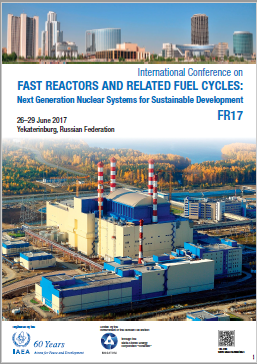Speaker
Dr
Stéphanie Cornet
(Nuclear Energy Agency)
Description
Activities related to the fast reactors systems at the Nuclear Energy Agency (NEA) mainly focus on scientific research and technology development needs and are carried out within the Nuclear Science Division. In particular, projects related to the advanced nuclear systems and fuel cycles are carried out through the Working Party of Scientific Issues of the Fuel Cycle (WPFC) and its five related experts groups covering all scientific aspects of the fuel cycle from front to back-end. Ongoing projects on advanced systems include fuel cycle scenarios, fuels, materials, physics and chemical separations. Members of the expert groups cooperate to share recent research advancements at an international level and help identify gaps and needs in the field.
Current activities focus on nuclear systems in particular on the challenges associated with the adoption of new materials and fuels such as for example cladding materials, fuels containing minor actinides, or the use of liquid metal as coolants.
The expert group on Innovative Fuels is conducting joint and comparative studies to support the development of innovative fuels in particular minor actinide bearing fuels. Ongoing work involves a benchmark study on fuel performance codes and experiments
The new expert group on Liquid Metal Technology includes projects on liquid Na, lead or lead-bismuth) to support: (1) the development of construction codes used for design (design rules), (2) identify the key technical issues for licensing, (3) give recommendations for operation, inspection and handling.
The report on the effects of uncertainties of input parameters prepared by the expert group on Advanced Fuel Cycle Scenarios will be published soon. The purpose of this study was to identify sources of uncertainty and use sensitivity studies to assess their impacts on system level results. Members of the expert group are currently working on a scenario study on transuranic management in order to assess the quantity materials contained in spent fuel that could be burnt using various fast burner fleets. In addition, a benchmark study on dose rate calculation for irradiated fuel assembly is being undertaken.
At the back-end of the fuel cycle, separation technologies (aqueous and pyrochemical) are being assessed by the Expert Group on Fuel recycling Chemistry and a state-of-the art report on minor actinide separation chemistry is being finalised.
Country/Int. Organization
Nuclear Energy Agency
Authors
Dr
Stéphanie Cornet
(Nuclear Energy Agency)
Ms
nathalie chauvin
(CEA)

